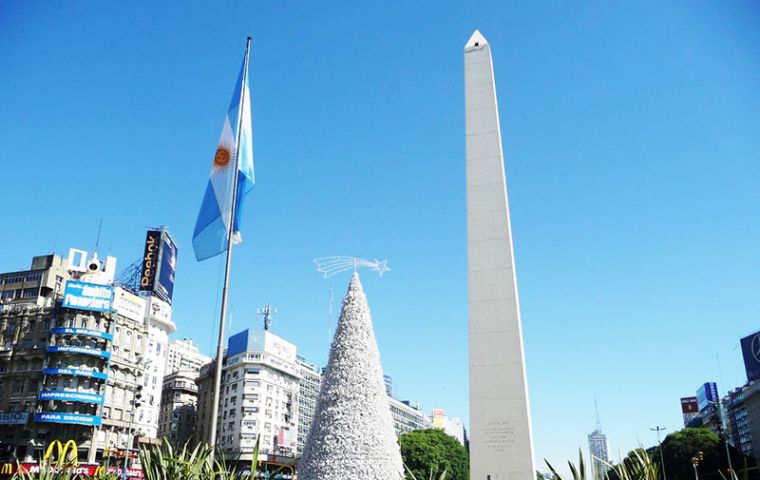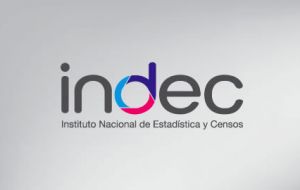MercoPress. South Atlantic News Agency
Half the Argentine labor force make a monthly average of US$ 565, says Indec
 According to the survey 10% of the poorest Argentine households concentrate 1.9% of the overall national income while the 10% at the other end, 29.1%.
According to the survey 10% of the poorest Argentine households concentrate 1.9% of the overall national income while the 10% at the other end, 29.1%.  The Indec survey also shows that at the end of the 2016 third quarter, some 10.8 million Argentines received no income.
The Indec survey also shows that at the end of the 2016 third quarter, some 10.8 million Argentines received no income. Half the Argentine labor force employed was making at the end of the third quarter a monthly average of 9.000 Pesos, equivalent approximately to US$ 565, while the poorest 10% averaged 2.500 Pesos (approx US$ 165) and the richest 10%, anywhere from 20.000 to 250.000 Pesos (US$ 1.250 to 15.000) a month, according the revamped Argentine stats and census office, Indec.
The figures belong to the latest “Functional income distribution” survey for July/September this year taking into account an economy contraction of 3.7%, unemployment rate of 8.5% and non registered unemployment of 7%.
When the stats include Homes, which means all incomes of a household, half of them make 15.700 Pesos a month on average (almost US$ 1.000), the 10% poorest, 5.828 Pesos (US$ 365) and the 10% better off from 41.000 to 280.000 Pesos (US$ 2.500 to US$ 18.000).
This means that the poorest 10% of Argentines under the Income distribution report and which includes over two million people, 7.6% of the population lives on 4.056 Pesos a month (US$ 256), while at the other end the average is 60.962 Pesos a month (US$ 3.800), which represents 11.5% of the survey or 3.1 million people.
In other words, 10% of the poorest Argentine households concentrate 1.9% of the overall national income while the 10% at the other end, 29.1%. The Indec survey also shows that at the end of the 2016 third quarter, some 10.8 million Argentines received no income.
Following the release of the survey president Mauricio Macri said that his government shed light and transparency on the level of inflation and poverty Argentina was suffering and this was “the commitment I promised on taking office. It's the only way of having rational relations with respect and admitting things as they are, and must be improved by an overall effort from the whole country”.




Top Comments
Disclaimer & comment rules-

-

-

Read all commentsFidelito, the article did acknowledge “non registered employment” which is a poorly translated expression for trabajo en negro.
Jan 07th, 2017 - 12:47 pm +7Yes, the high tax rates on employment do indeed encourage off-the-books black-work, which is just one more tax-avoidance criminal activity subject to heavy sanctions. Black-work is by no means limited to “poorer households” since it's practiced by a lot of professionals as well, again as a tax-avoidance measure which is one of the principal national sports, after football and robbery. And let's not forget the 35% or so of the population that even the government recognises to be in poverty in spite of all that . But these conditions have been the case for many years and only newsworthy because the present INDEC is willing to confront them a bit more honestly than was the case of certain governments in the past, for whom the INDEC was a political propaganda tool.
The extraordinarily high taxes on formal economic activity here in Argentina represent one significant reason there is no little willingness to increase the growth in formal employment.
Jan 07th, 2017 - 01:08 pm +7The huge deficit in actual collection of taxes due to large-scale participation in criminal avoidance practices means that the greater revenue burden falls upon formal economic sector, which in turn tends to promote further avoidance. In Argentina, the socially acceptable practice of tax avoidance is closely linked to acceptance and participation in other forms of corruption and criminal behaviour. Certain revenue features here are essentially regressive, such as the 21% IVA (VAT), which disproportionately impacts lower income players.
Been happening for many years, most money is under the mattress. The Greeks have a similar system in not paying taxes and look at them.
Jan 07th, 2017 - 03:30 pm +7Commenting for this story is now closed.
If you have a Facebook account, become a fan and comment on our Facebook Page!